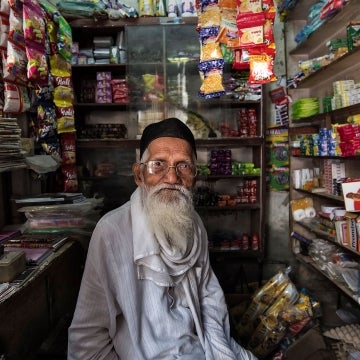Fast-moving consumer goods (FMCG) companies have a unique opportunity to accelerate the growth of B2B e-commerce platforms that serve micro-retailers or neighborhood shops – also called kiranas, dukas, and many other names. In emerging economies, these shops provide essential goods, create employment, and play a crucial role in local economies and community life. They serve as social hubs where people gather, exchange information, and build relationships. Micro-retailers are the backbone of FMCG distribution in emerging economies, especially in low-income and hard-to-reach areas, where they account for the vast majority of sales. Despite their critical role in getting essential goods to consumers, they frequently struggle with cash flow constraints, limited access to credit, and supply chain inefficiencies.
Fast-moving consumer goods (FMCG) companies have a unique opportunity to accelerate the growth of B2B e-commerce platforms that serve micro-retailers or neighborhood shops
FMCG companies, meanwhile, depend on distributors and wholesalers to reach consumers but have little visibility into the last mile of their supply chain. This blind spot hinders their understanding of shopkeepers’ challenges, preventing them from offering targeted support like flexible financing, promotions, or optimized delivery. To overcome these challenges, a new generation of B2B e-commerce platforms has emerged, offering solutions that simplify stock ordering; streamline warehousing, distribution, and online ordering; and leverage shopkeepers’ transactional data to offer embedded financial services like buy now, pay later (BNPL) options and insight into demand and stock. By providing short-term credit for inventory purchases, these solutions help retailers maintain stock without tying up their cash, increasing liquidity for more effective management of daily expenses and investment in business growth. However, scaling these platforms remains difficult due to high capital expenditure (to fund warehousing and logistics), operational costs (support to onboard micro-retailers), as well as constraints in retailer financing (affordable capital which limits flexible payment options).
FMCG companies can benefit significantly from B2B eCommerce platforms by streamlining their supply chain, expanding their reach, and improving operational efficiency. These platforms enable direct and data-driven interactions with distributors and retailers, reducing dependency on intermediaries and lowering costs. Additionally, they provide real-time insights into demand trends, inventory levels, and customer preferences, allowing for better forecasting and more agile decision-making.
Through multiple pilot projects, CGAP and TRANSFORM have explored key elements of platform business models, highlighting the impact of partnership-driven approaches. These pilots demonstrate how FMCG companies can unlock greater value by shifting from purely transactional relationships to strategic collaborations with these platforms.
Tailored partnerships to strengthen efficiency, sustainability, and impact
Strategic collaborations between FMCG firms and B2B e-commerce platforms can enhance operational efficiency and financial sustainability.
CGAP and TRANSFORM supported Aye Finance in India, a fintech specializing in micro-enterprise lending. CGAP leveraged its expertise in gender-focused financial inclusion, helping Aye Finance to develop and test a tailored loan designed to meet the unique cash flow needs of female traders. TRANSFORM supported Aye Finance with enhancements to its digital credit and payment platform (launched under the name of SwitchPe), which facilitates seamless partnerships between micro-retailers and FMCG distributors, providing on-tap, non-collateralized credit with a 14-day interest-free repayment period. This allows retailers to finance inventory, while distributors receive payments within 24 hours.
In Africa, CGAP and TRANSFORM have supported Boost, a digital ordering platform for retailers, by enabling its BNPL option. This feature helps shopkeepers access inventory without needing upfront capital. TRANSFORM enabled the integration of promotional features to boost engagement, while Unilever’s connections secured a major distribution deal. Ernst & Young helped to refine the pricing, strengthening Boost’s long-term viability. CGAP, meanwhile, worked with Boost in Nigeria to pilot test the BNPL of Unilever products and provide data-driven insights to Boost’s female retailers as part of Unilever’s ‘Shakti’ program aimed at empowering women. CGAP commissioned an impact study conducted by 60 Decibels for Boost Nigeria, yielding promising results.
In the Philippines, CGAP and TRANSFORM supported &frnds in testing the expansion of its zero-interest, consignment-based BNPL model for last-mile micro-retailers, such as sari-sari stores. By partnering with FMCG companies, the initiative allowed store owners to expand and diversify their inventory with no upfront costs or financial risk, improving their ability to serve their communities and grow their businesses.
Rather than treating B2B e-commerce platforms as mere sales intermediaries, FMCG companies can integrate them into broader supply chain strategies to drive efficiencies and market reach.
“Before our wholesale business had two motorcycles for delivery. Now we have 5 motorcycles and a truck for delivering goods to our clients – we have doubled our sales.” – Female owner of a local retail and wholesale shop on the benefits of joining &frnds
Empowering micro-retailers
When B2B e-commerce platforms integrate micro-retailers into the digital FMCG supply chain, they enhance their resilience. Embedded finance solutions like BNPL provide shopkeepers with the liquidity to maintain stock, expand their businesses, and build credit histories—securing livelihoods through fostering long-term financial stability. Collaboration between these platforms and FMCG companies can deliver huge gains in financial inclusion. Through these partnerships, FMCG firms can deepen market reach while fostering a more inclusive supply chain. Initiatives such as those led by TRANSFORM and CGAP demonstrate how targeted support—including pilot testing, technical assistance, financial innovation, and strategic collaboration—can help these platforms scale sustainably, bridging the gap between FMCG companies and last-mile retailers to create a more equitable retail ecosystem.
For a detailed report on how B2B e-commerce companies are digitizing the last mile of the FMCG supply chain and enabling financial inclusion, download CGAP’s publication: Empowering Small Giants: Inclusive Embedded Finance for Micro-retailers.



